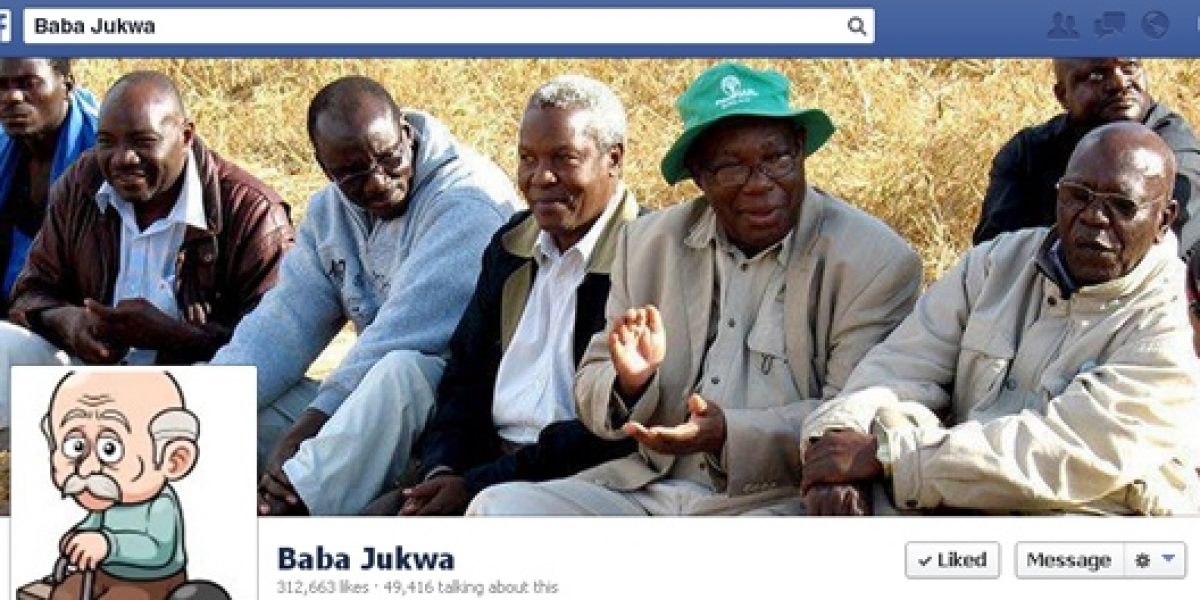The Baba Jukwa Facebook page currently has 300 000 plus followers, and regularly leaks details on the activities of the Zimbabwean government (with contact numbers of officials!). The character is commonly cited as an insider of the ruling ZANU-PF, who describes himself as a “concerned father, fighting nepotism and directly linking community with their Leaders, Government, MPs and Ministers”.
It can be said that the character’s online presence has become an extension of public opinion – whether users agree with him or not – his page is flooded with commentary and opinions after each posting. These come not only from those in Zimbabwe but from the diaspora who are eager for information on what is happening in their home country. Social media has been a vital link between Zimbabwean locals and the widely spread diaspora as it has provided instant dissemination of opinions and information.
Baba Jukwa is just one manifestation of a silent revolution that is taking place. It is thanks in large part to the rising African middle class who are increasingly looking to integrate their lives with communications technology and in particular, affordable mobile devices. For example, a 2013 survey conducted by the Mass Public Opinion Institute (MPOI) noted that 9 out of 10 Zimbabwean youths already have access to mobile phones. Social media has the ability to surpass the physical barriers of traditional communications infrastructure, such as telephone lines.
The social media, as a space for political deliberation, is most acute in places where few other spaces for open debate exist. During the Arab Spring, the social media became a vital tool to breaking psychological barriers, as users shared information and at times organised real protests in a short space of time. Similarly Zimbabweans (including the diaspora) have utilised the Baba Jukwa Facebook page for information and updates, to retrieve links to check their voter registration status and to write comments that encourage each other to vote. Many are expected to follow the elections today in Zimbabwe via Baba Jukwa.
However, the reality is that even if Zimbabweans have become motivated to vote and advocate for change, they cannot actually vote for Baba Jukwa. While he is a channel to direct mass discontent, he remains a fictional character that rarely engages the users beyond broadcasting information. A recent piece on The Guardian website aptly said, the technologically savvy youth are already the demographic who count themselves as opposition to the status quo. Thus a real alternative to the current candidates is still missing. However what the Baba Jukwe phenomenon has done is increase public awareness of the kind of leaders Zimbabweans do not want.
The demographic changes on the continent will hold serious political implications for Zimbabwe in future. During an interview with Forbes magazine, Mo Ibrahim stated that the average African leader is 63 while the average citizen is 19. The CIA World Factbook similarly notes the average Zimbabwean age as 19.5 years. It is important to note that the rising use of communication technologies is part and parcel of a unique demographic window.
At a SAIIA event in May 2013, Ibrahim Mayaki, President of the New Partnership for Africa’s Development – NEPAD, noted the sobering fact that in the next 20 years many of Africa’s aging leadership will be replaced by young leaders. Yet little has been done to mend the gaps in perceptions between the previous generations of leaders and the youth, whose demands will increasingly require technocratic skills over political rhetoric.
Regardless, the real impact of social media in Zimbabwe will need to be explored after the election. Is it an effective platform? Clearly, its future rests in the hands of its users.
While freedom of expression is and will remain important in Zimbabwe’s political process, it needs to be channelled into changes in reality. The Nigerian political scientist Claude Ake said “freedom of speech and freedom of the press do not mean much for a largely illiterate rural community” who are absorbed by the struggle to survive. The challenge is to convince the rest of the estimated 1 to 3 million Zimbabwean diaspora (most of who are not followers of the Baba Jukwa saga) that criticism can in fact achieve results.
This is not to say social media is irrelevant to development in Africa. The opposite is true. Social media has the potential to speak to change. Take for example the Obama administration’s smartphone app – used during the 2012 US Presidential elections – which among other things helped identify the homes of Democrat supporters in a suburb (thereby simplifying the dissemination of party related information). Imagine the possibilities if governments and development agencies could pin-point the homes that have yet to receive running water or medical care. The mobile potential is already being explored in Kenya where the mobile micro-financing service, M-Pesa, allows users who cannot afford bank accounts or reach physical branches to make transactions. There is clearly space for social media integration into everyday life.
So looking beyond the election horizon there are already signs that the Zimbabwean landscape will never be the same again. A media culture is developing through an increasingly transnational population (via migration, outlook and the very nature of the media’s ability to reach across borders). This comes together with a diaspora and youthful population who have aspirations that cannot be contained. In fact the first privately-owned satellite television station, 1ST TV, was recently launched to challenge the dominance of the government-owned Zimbabwe Broadcasting Corporation (ZBC).
What the Baba Jukwa case and the new television channel reveal are the rising demand for independent and alternative voices. As the spaces for independent thinking grow, the only feasible way to remove the credibility of such spaces is to eliminate the barriers to robust political debate.








